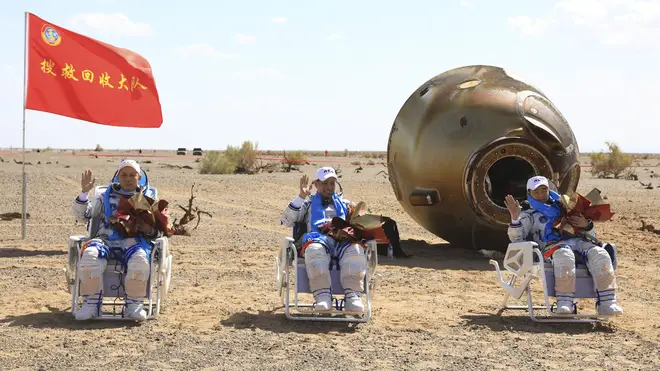
Iain Dale 7pm - 10pm
17 September 2021, 11:34

Nie Haisheng, Liu Boming and Tang Hongbo landed in the Gobi Desert.
Three Chinese astronauts have returned to Earth after a 90-day stay aboard their nation’s first space station, marking China’s longest mission yet.
Nie Haisheng, Liu Boming and Tang Hongbo landed in the Shenzhou-12 spaceship just after 1.30pm local time (6.30am BST) after having undocked from the space station on Thursday morning.
State broadcaster CCTV showed footage of the spacecraft parachuting to land in the Gobi Desert, where it was met by helicopters and off-road vehicles.
Minutes later, a crew of technicians began opening the hatch of the capsule, which appeared undamaged.
The three astronauts emerged about 30 minutes later and were seated in reclining chairs just outside the capsule to allow them time to readjust to Earth’s gravity after three months of living in a weightless environment.

The three are due to fly to Beijing on Friday.
Mission commander Mr Nie told CCTV: “With China’s growing strength and the rising level of Chinese technology, I firmly believe there will even more astronauts who will set new records.”
After launching on June 17, the three astronauts went on two spacewalks, deployed a 33ft mechanical arm, and had a video call with China’s leader Xi Jinping.
While few details have been made public by China’s military, which runs the space programme, astronaut trios are expected to be brought on 90-day missions to the station over the next two years to make it fully functional.
The government has not announced the names of the next set of astronauts nor the launch date of Shenzhou-13.

China has sent 14 astronauts into space since 2003, when it became only the third country after the former Soviet Union and the United States to do so on its own.
China’s space programme has advanced at a measured pace and has largely avoided many of the problems that marked the US and Russian programmes that were locked in intense competition during the heady early days of spaceflight.
That has made it a source of enormous national pride, complementing the country’s rise to economic, technological, military and diplomatic prominence in recent years under the firm rule of the Communist Party under Mr Jinping.
China embarked on its own space station programme in the 1990s after being excluded from the International Space Station, largely due to US objections to the Chinese space programme’s secrecy and military backing.

The government in Beijing has simultaneously pushed ahead with uncrewed missions, placing a rover on the little-explored far side of the Moon. Last December, the Chang’e 5 probe returned lunar rocks to Earth for the first time since the 1970s.
China this year also landed its Tianwen-1 space probe on Mars, with its accompanying Zhurong rover venturing out to look for evidence of life.
Another programme aims to collect samples from an asteroid, an area in which Japan’s rival space administration has made progress of late.
China also plans to dispatch another mission in 2024 to bring back lunar samples and is pursuing a possible crewed mission to the moon and eventually building a scientific base there, although no timeline has been proposed for such projects.
A highly secretive space plane is also reportedly under development.